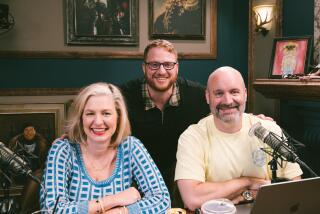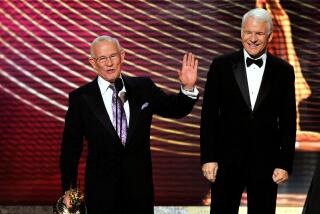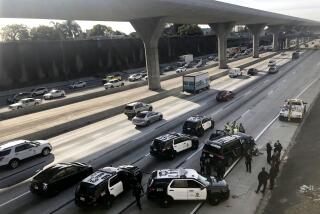‘Click and Clack,’ the Spark Plugs of Public Radio
BOSTON — Moments before they were scheduled to go on the air at the studios of WBUR-FM here, Tom and Ray Magliozzi were sitting at a conference table, poring over the latest truckload of mail.
Tom was eating a sweet roll, and large crumbs had established themselves in his thick gray beard. Abruptly, he looked up with what at first sounded suspiciously like a Serious Question.
“Is Pro Bono Sonny Bono’s other child?”
Before Ray could swallow his own Danish to respond, Doug Berman, producer of National Public Radio’s hit show “Car Talk,” had interrupted.
“No,” said Berman. “It’s the status you reach after amateur Bono.”
Inside the control room, it took only one phone call for Tom and Ray to affirm the “Car Talk” doctrine that outrageous can be contagious.
Kirsten, from nearby Needham, Mass., was bothered by a persistent noise in her windshield wipers.
“They sound like a pig doing Lamaze,” Kirsten said.
“So they squeal?” asked Ray.
“No,” said Kirsten. “They snort.”
Fifty-two-year-old Tom, 12 years older than Ray and possessor of two master’s degrees and a Ph.D, stepped in to add a little analytical reasoning to the discussion.
“Logic would force you to deduce that it is not the windshield wipers,” Tom volunteered.
“You mean there really is a pig in there?,” Kirsten rejoined.
And so continued another hour of a program that began in 1976 as a one-shot, local call-in show about cars on this Boston University-based public radio station. On a panel with other area mechanics, the Magliozzis were so well-received that soon, as “Click and Clack, the Tappet Brothers,” they were dispensing advice about cars on their own local show.
Three years ago, NPR’s Susan Stamberg invited the brothers to contribute regularly to “Weekend Edition.” By the end of 1987, the Magliozzis were hosting “Car Talk” as a national program. In Los Angeles, “Car Talk” is heard Saturdays at 8 a.m. on KPCC-FM (89.3) and at 10 a.m. on KCRW-FM (89.9).
Their expertise about things automotive stems from childhoods spent as tinkerers and from nearly 20 years as proprietors of a do-it-yourself garage across the river in Cambridge. First called Hacker’s Haven and now known as the Good News Garage, the shop was opened as a place where car repair could be demystified. Though the Good News Garage has gradually evolved into offering more conventional car-repair service, the Magliozzis’ philosophy that “these are cars, not brain surgery” remains its guiding principle.
While immodestly declaring themselves to be among the world’s leading experts on wheeled vehicles, Tom and Ray know as least as much about people as they do about cars. Ray, a humanities graduate from MIT, is a former VISTA volunteer who also taught junior high school in Vermont. Armed with his own MIT degrees in chemical engineering and economics, Tom spent 12 years with a company that made instruments for chemical plants.
These days, Tom leaves the garage operation to Ray and devotes his own time to teaching marketing at Boston University. Once a week, the pair get together to air their thoughts about alternator belts and other automotive arcana.
“My husband and I are looking for a new car,” Judy, from Alameda, Calif., reported. “We’ve narrowed it down to either a Hyundai Sonata or a Toyota Cressida.”
“Those two cars,” opined Tom, “are about as much alike as my ’74 Chevy and the BMW 325XI.”
In accents as heavy as the sludge George Bush promised to clean up out of the Boston harbor, Tom and Ray find they are often serving as the advisory go-betweens for consumers--drivers--and representatives of an industry fraught with consumer mistrust.
But just as often, screening the 2,000 or so calls that come in each week, Tom and Ray act as relationship counselors for the innumerable arguments couples seem to have about their cars.
“Tell your husband you just can’t live with a man who wants to drive around in a Sonata,” Tom advised Judy-from-Alameda.
Rather than the Ann Landers of crankshaft oil, producer Berman likens the Magliozzis to “the Dr. Ruth” of cars.
“It’s fun when we can pit a husband and wife against each other,” Ray said. “It’s fun to find out how the choice of a car has affected their relationship.”
“We’re rabble-rousers,” Tom said cheerfully. “Troublemakers.”
Still, said Ray, “we force people back into a sense of humor. We try to make them realize that it’s only a car.”
In the early days of “Car Talk,” Tom and Ray somehow managed to keep their own irreverent senses of humor somewhat in check. There were none of the huge belly-laughs or deep guffaws that listeners now associate with Tom and Ray. Then one day Ray had an on-air difference of opinion with his older brother.
“Au contraire, piston-puss,” Ray said.
After that, said Tom, “it was downhill all the way, no brakes.”
“And at that moment,” Ray added, “I realized my older brother was a dummy.”
“Pay no attention to him,” Tom cautioned. “My brother does not have it all together. He’s suffering from carbon monoxide disease.”
Now the Magliozzis make a point of insulting at least four ethnic groups and three car manufacturers per broadcast hour. Although they claim what Ray calls “the combined IQ of an armadillo,” the brothers also offer their share of serious counsel.
“If I had one piece of advice,” Ray said, “I’d say go to the place with the lowest overhead.”
When it comes to serious, Tom said, people who drive aging cars retire the award.
“An old car reminds you of your own mortality,” his brother agreed. “It’s a geriatric, it has to be taken to the bathroom.”
Recently, Tom and Ray turned “Car Talk” into an internationally syndicated newspaper column. A book is in progress and, after that, Tom promised, “a movie, with Roseanne and Alf.”
“Then,” said producer Berman, “a game show, ‘Steering Wheel of Fortune.’ ”
“A theme park,” Ray suggested. “Greaseland.”
And ultimately, said Tom, “a religion, featuring the Rev. L. Ron Tappet.”
“We’ve had so much experience on public radio begging for money that we thought we could turn it into a religion,” Berman explained.
If that plan fails, Tom may resort to his goal of running for philosopher king. As he sees it, the position might afford him a forum for airing such notions as his conspiracy theory to explain the first Arab oil embargo. According to Tom’s thesis, the Arabs and the Japanese joined forces to raise oil prices unconscionably and then flood the United States with little tinny cars.
“The only question is,” Tom mused, “what did they get in return?”
Almost in unison, the brothers brothers brightened as they answered the question: “Control of the world!” they shouted. And then they laughed, very hard.
More to Read
The biggest entertainment stories
Get our big stories about Hollywood, film, television, music, arts, culture and more right in your inbox as soon as they publish.
You may occasionally receive promotional content from the Los Angeles Times.










